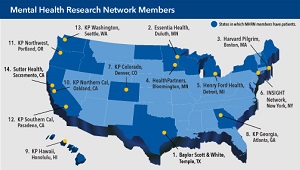Julia J. Smith, MS
Biography
Julia J. Smith, MS, has a passion for utilizing existing data from electronic health records (EHRs) to illuminate the effectiveness and benefits of treatments and medical modalities, as well as to identify people who may have health care needs that are not being sufficiently addressed.
Ms. Smith came to KPWHRI in 2021, joining projects to validate prediction models, compare suicide risk predictions for those undergoing pharmaceutical treatments, and analyze the impact of an intervention for falls risk. This work is closely aligned with her passion to leverage existing data to identify people who may benefit from intervention or additional awareness and education on health.
Prior to joining KPWHRI, Ms. Smith worked in research at Southcentral Foundation for 13 years with a focus on health care services and mental health research, as well as data management. At SCF, her analyses projects included measuring the impact on quality and health outcomes after a shift to an innovative patient-centered medical home model, assessing patient and provider characteristics associated with completed depression and alcohol screening among primary care patients, performing epidemiologic and biomarker studies of tobacco use, measuring the impact of an intervention developed for people with complex health care needs, creating a registry of fragile pediatric customers for primary care providers, and creating a system to balance primary care provider panels through risk prediction based on EHR data and publicly available social determinants of health (SDoH) variables.
Ms. Smith also spent 2 years with a Pacific Northwest payor in Portland, Oregon, conducting research as well as steering the build of data infrastructure for clinical services and a new technology solution with the goal of creating systems that would easily illuminate clinical effectiveness and quality.
Ms. Smith’s experience in research is built on a foundation in education, teaching, and mentorship that she carries with her through mentoring high school youth in the use of statistics in applied equity research as well as through mentoring professionals in health care services research methods.
Areas of research focus
-
Biostatistics
Analyses of secondary, observational data; prediction models
-
Aging & geriatrics
Alzheimer’s, dementia, falls risk
-
Social determinants of health
Identifying variables for analysis and prediction modeling from publicly and commercially available SDoH data
-
Health services & economics
Comparative effectiveness analyses, cost benefit analyses, intervention impact of health care delivery programs and products
-
Mental health
Depression, substance use, suicide
Recent Publications
Avey JP, Dirks LG, Dillard DA, Manson SM, Merrick M, Smith JJ, Prickette GC, Tetpon S, Galbreath D, Triplett B, Robinson RF. Depression management interests among Alaska Native and American Indian adults in primary care. J Affect Disord. 2018 Oct 15;239:214-219. doi: 10.1016/j.jad.2018.05.075. Epub 2018 Jun 7. PubMed
Muller CJ, Robinson RF, Smith JJ, Jernigan MA, Hiratsuka V, Dillard DA, Buchwald D. Text message reminders increased colorectal cancer screening in a randomized trial with Alaska Native and American Indian people. Cancer. 2017 Apr 15;123(8):1382-1389. doi: 10.1002/cncr.30499. Epub 2016 Dec 21. PubMed
Dillard DA, Avey JP, Robinson RF, Smith JJ, Beals J, Manson SM, Comtois KA. Demographic, clinical, and service utilization factors associated with suicide-related visits among Alaska native and American Indian adults. Suicide Life Threat Behav. 2017 Feb;47(1):27-37. doi: 10.1111/sltb.12259. Epub 2016 Apr 25. PubMed
- ← Previous
- 1
- 2 (current)
- Next →
Research

Dementia risk screening tool shows promise
In a new study, a tool to help discover undiagnosed dementia performed well in 2 separate health systems.
mental health

$10 million to expand Mental Health Research Network
NIMH funding will enable the MHRN to conduct larger studies in integrated health systems on topics that matter most.
aging & geriatrics

Do drugs cause falls for adults with dementia?
Researchers find a relationship between prescribed central nervous system-active medications and increased risk of falling among older people with dementia.


